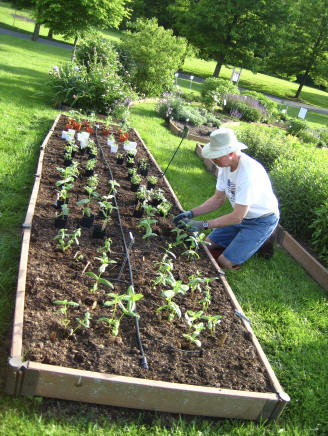 Watering Options - Given the hotter days, watering plants becomes an important garden task. One can drag around hoses, use sprinkler and soaker hose systems, or do a one-time installation of a watering or irrigation system. Such a system consists of a simple one-half inch header hose with one-quarter inch tubing sections running to individual plants or planted areas. The end of the one-quarter inch tubing can be fitted with emitter spikes of various heights and watering patterns that range from a dribble to circular or directional sprays.
Watering Options - Given the hotter days, watering plants becomes an important garden task. One can drag around hoses, use sprinkler and soaker hose systems, or do a one-time installation of a watering or irrigation system. Such a system consists of a simple one-half inch header hose with one-quarter inch tubing sections running to individual plants or planted areas. The end of the one-quarter inch tubing can be fitted with emitter spikes of various heights and watering patterns that range from a dribble to circular or directional sprays.
Starter systems are available as a package, are relatively inexpensive, and can last for years. In my flowerbeds and vegetable garden, spike emitters are in place that water a small dribble up to a 12" radius of spray, with 12" taller spikes that spray at a height. All that is required is to turn the system on for a desired length of time. Granted, the old-fashioned ‘back and forth" or rotational sprinklers work well. No matter what is used, just be sure to water early in the morning for less evaporation loss and to give plants adequate time to dry.
Turf grass is stressed during this heat, so mowing at a higher setting is most beneficial. Do not mow when grass is browning and dormant. Cutting too short leaves grass stems with little leaf area to retain any moisture and taller grass actually helps crowd out weeds. Keeping weeds under control at this time of year is critical. Many are setting seed right now. Letting new weed seeds escape into your garden just compounds weed problems for years to come since weed seeds are viable in soil for an astounding number of years.
Weed problems also result from gardeners who believe they must till their soil each spring, or who feel they must faithfully till their vegetable garden. First of all, tilling just turns up more weed seeds if any are present leading to the perceived need to till later to get rid of the weeds. Tilling really does not work to get rid of weeds when more weed seeds are present. Secondly, even worse, repeated tilling turns soil into powdery soil and destroys the soil’s structure, especially disrupting beneficial earthworm colonies. Earthworms travel via their own underground tunnel networks that get destroyed by tilling.
Soil compaction and increased evaporation result from over tilling. Better to be a no-till gardener and use compost and mulch to control weeds. Adding organic matter increases valuable water retention. Compost or shredded leaves are great mulches that really hold water, even better than bark mulch, and their added benefit is they benefit earthworms and beneficial microbes.
Japanese beetles and other leaf-eating critter populations are in full destructive form now. A prior wet summer enables Japanese beetle larvae to better survive their dormancy in the ground leading to increased populations such as being seen now. A drought actually reduces the larvae population and subsequent season’s Japanese beetles. Last summer unfortunately was good for larvae. The familiar yellow and green pheromone traps are great if you want to draw more Japanese beetles in to eat your plants. Avoid them since all they do is draw in more beetles. Better to hand pick beetles into a can of soapy water or spray with an appropriately labeled insecticide – always read the label FIRST, follow dilution directions, and use personal protective equipment.
Right now many garden centers are having end of season sales on annuals and perennials. Spruce up bare spaces or fill in behind spent annuals with these bargains. Deadhead perennials for a second flush of bloom. Also deadhead annuals for the same result. Deadheading is simply cutting back spent flowers to or below a set of leaves, promoting a second flush of bloom. Salvia, Purple coneflower, Daisy, Black-eyed Susan, even Petunias will benefit from this type of deadheading. Straggly Petunias can be given a crew cut, and with fertilizing, will rebound full of blooms. Fertilizing right now will perk up most any annual and perennial plants.
If you have any plants that are struggling with disease, consider removing them to the trash, not the compost pile. Leaving them can lead to disease spread or over wintering of disease.
Read other articles on gardening techniques
Read other summer related gardening articles
Read other articles by Connie Holland